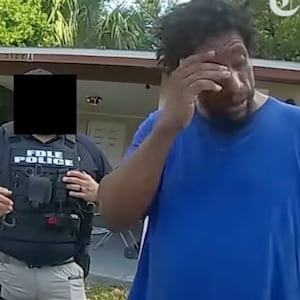One of the Floridians arrested this summer for allegedly voting illegally in 2020 had his charges tossed out by a Miami judge on Friday, dealing a significant blow to Florida Gov. Ron DeSantis’ much-hyped but increasingly shaky crusade.
Miami-Dade Circuit Judge Milton Hirsch ruled that the Office of the Statewide Prosecutor did not have the jurisdiction to charge Robert Lee Wood, 56, and his two felony voter fraud charges were dropped.
The statewide prosecutor, who issued the warrant for Wood’s arrest, is limited to prosecuting crimes that involve two or more judicial circuits. Wood’s attorney, Larry Davis, harped on these guidelines, arguing the agency could not charge his client because Wood’s alleged crimes—registering to vote and casting a ballot despite being ineligible—both occurred in Miami-Dade County.
Prosecutors countered that Wood committed the offenses in Miami-Dade and Leon County, home to the state’s capital, because his voter registration form and ballot were certified in Tallahassee, a second judicial circuit.
But a judge rebuffed that argument Friday, stating that Wood took no part in transferring his voter application or ballot elsewhere, and thus was ineligible to be charged by the Office of the Statewide Prosecutor.
“Here the crime, if there was one, occurred exclusively in Miami,” Hirsch wrote in a motion to dismiss. “The ‘related transaction’—the merely ministerial transmission of completed forms to Tallahassee—was not a crime.”
Friday’s decision opens up the possibility that others charged with voter fraud in Florida may soon have their charges dropped, too, just months after DeSantis gleefully announced their arrest.
DeSantis has since come under fire for his so-called crackdown on voter fraud, with media outlets finding that most —if not all—of the 20 arrested in August said they had no clue they were ineligible to vote. Some said they were even issued voter ID cards.
Body-camera footage of three of the arrests, published this week by the Tampa Bay Times, showed apologetic cops handcuffing “suspects” who were equally hysterical and confused.
“I thought felons were able to vote,” Tony Patterson told an officer during his arrest. “That’s why I signed a petition form, that’s what I remember. Why would you let me vote if I wasn’t able to vote?”
The officer responded: “I’m not sure, buddy. I don’t know.”
Both Patterson and Wood were ineligible to vote in 2020 because they were convicted of murder or a sex crime—the lone exceptions to a 2018 resolution in Florida that restored voting rights to all other felons.
Florida has done little to protect ineligible felons from voting, however.
While being taken into custody, Patterson told police he was given a voter ID card and was never told he couldn’t vote. He registered, voted in 2020, then went on with his life for two years before police showed up at his home in August to arrest him, he said.
Even some Republicans have acknowledged that Florida hasn’t done enough to make certain felons aware of their ineligibility.
State Senator Jeff Brandes, a Republican who sponsored the legislation to keep certain felons from regaining voting rights, indicated that the arrests touted by DeSantis may not stand in court because the law requires suspects to have “willfully” committed voter fraud in order to be convicted.
“The more that comes out on the arrests, the more I believe the individuals involved had no knowledge or intent to violate the law,’’ Brandes tweeted in August. “Were these people ever notified that they were not eligible to vote? And can we prove that they did it willingly?”
Friday’s dismissal raises more questions about the efficacy of Florida's newly formed Election Crimes and Security Office, which has cost the state $1.2 million and so far arrested only 20 people—one of whom was Wood—in a state of 21 million.
DeSantis’ office did not return a request for comment about Friday’s ruling. On Wednesday, however, the state doubled down on its desire to prosecute those arrested—12 of whom were registered as Democrats.
“These individuals lied when they registered to vote,” the statement from the office of Florida’s Secretary of State said. “We are confident that when all the facts and evidence are revealed through the legal process, these arrests will be upheld in accordance with the law.”
Prosecutors said Friday that they planned to appeal Hirsch’s decision. Neither Wood nor his attorney responded to requests for comment from The Daily Beast on Friday.







